Abstract
The effect of xamoterol and (-)-isoprenaline have been compared for their activity at beta-adrenoceptor sites in a number of in vitro cardiac and smooth muscle preparations. Xamoterol produced weak positive chronotropic effects in guinea-pig, rat and cat atria (intrinsic activity less than 0.55, (-)-isoprenaline = 1). Positive inotropic effects were obtained in driven left atria of the cat but were absent in guinea-pig left atrial and right ventricular strip preparations. Agonistic effects were due to beta 1-adrenoceptor stimulation. Xamoterol was without beta-adrenoceptor-mediated inhibitory effects in guinea-pig ileal, tracheal and uterine preparations and in the rat vas deferens and oestrogen-primed uterus. Weak beta 2-adrenoceptor-mediated relaxation was obtained in progesterone-primed rat uteri. Xamoterol produced non-specific inhibitory effects in guinea-pig ileal and tracheal preparations. Xamoterol acted as a competitive antagonist at beta 1-(pA2 range = 7.4 to 7.8) and beta 2-adrenoceptors (pA2 range 5.2 to 6.2) and displaced [125I]-iodocyanopindolol from guinea-pig left atrial (pKD = 7.25) and uterine (pKD 5.24) membrane preparations. It is concluded that xamoterol displays a selective affinity for beta 1-adrenoceptors. Although its partial agonistic actions are more evident at beta 1-adrenoceptor sites, like prenalterol, xamoterol displays a degree of tissue rather than receptor-dependent selectivity.
Full text
PDF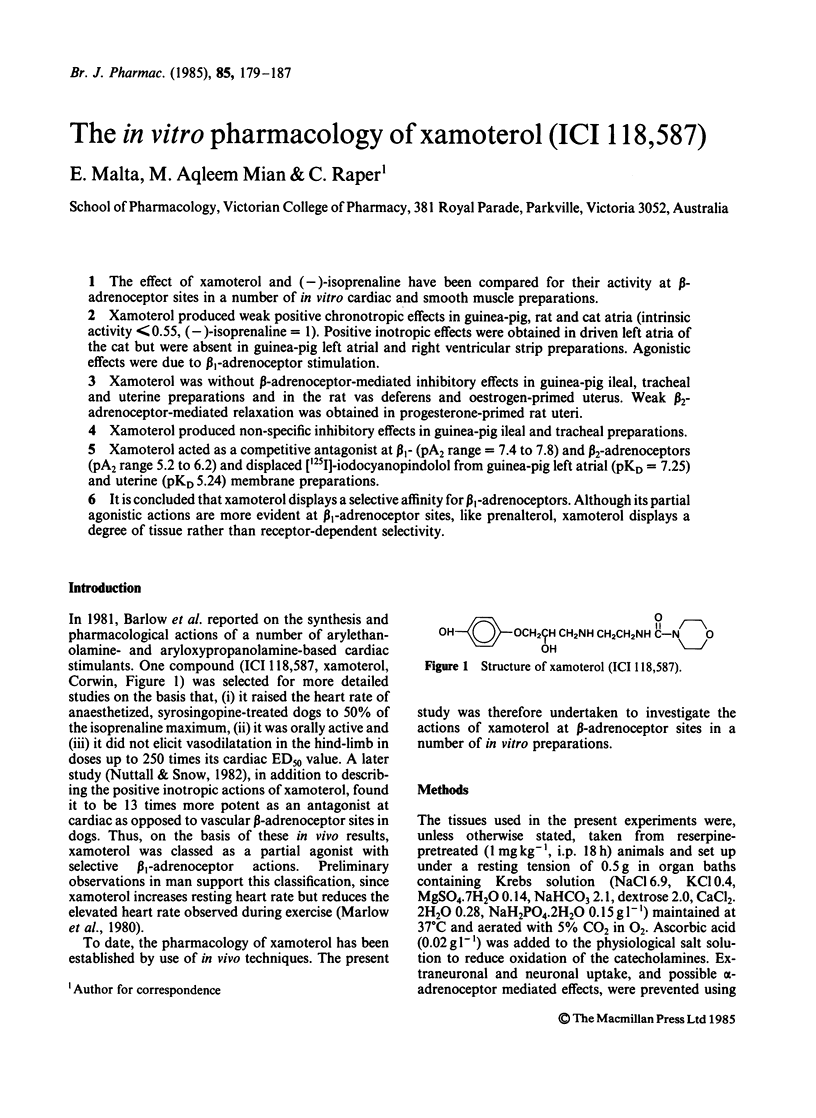
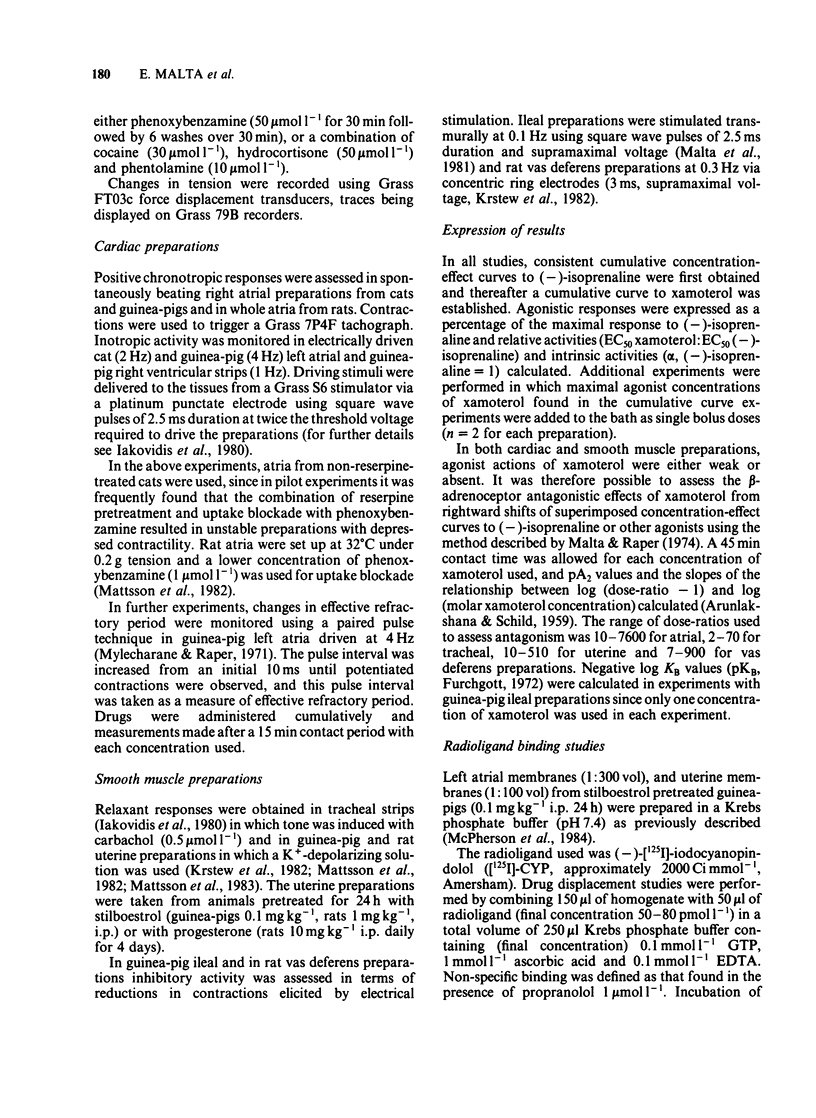
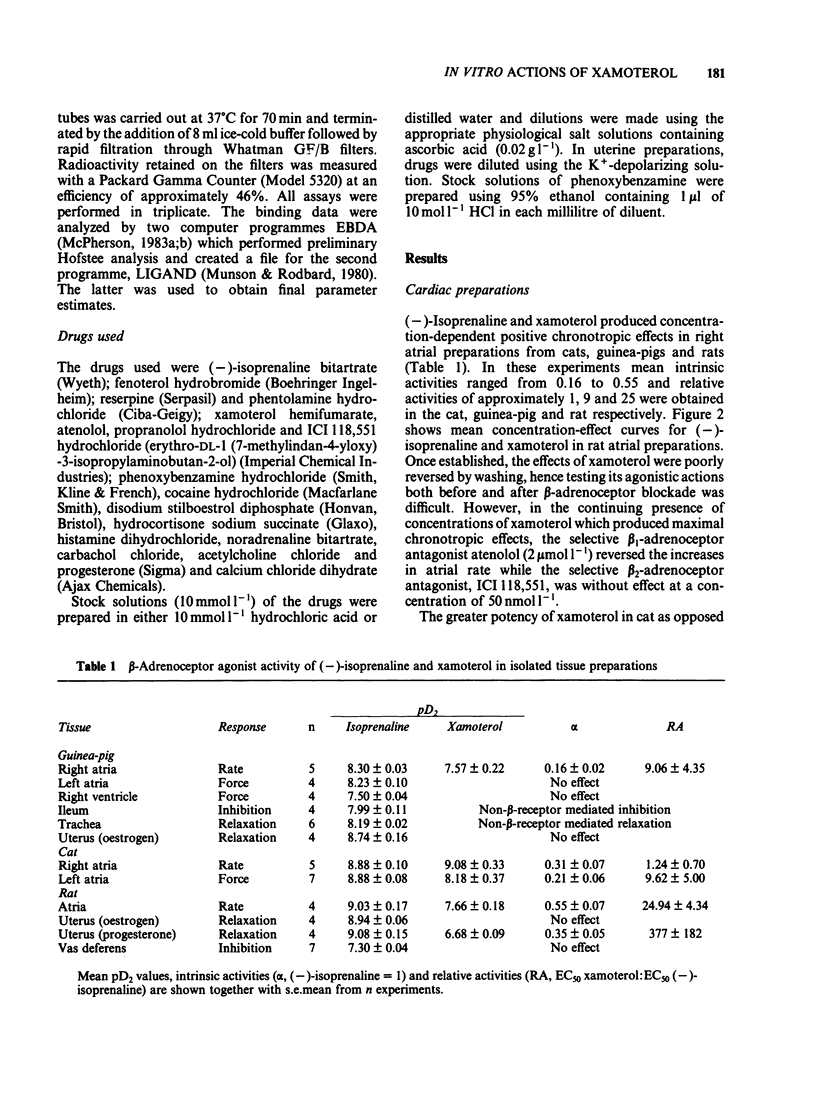
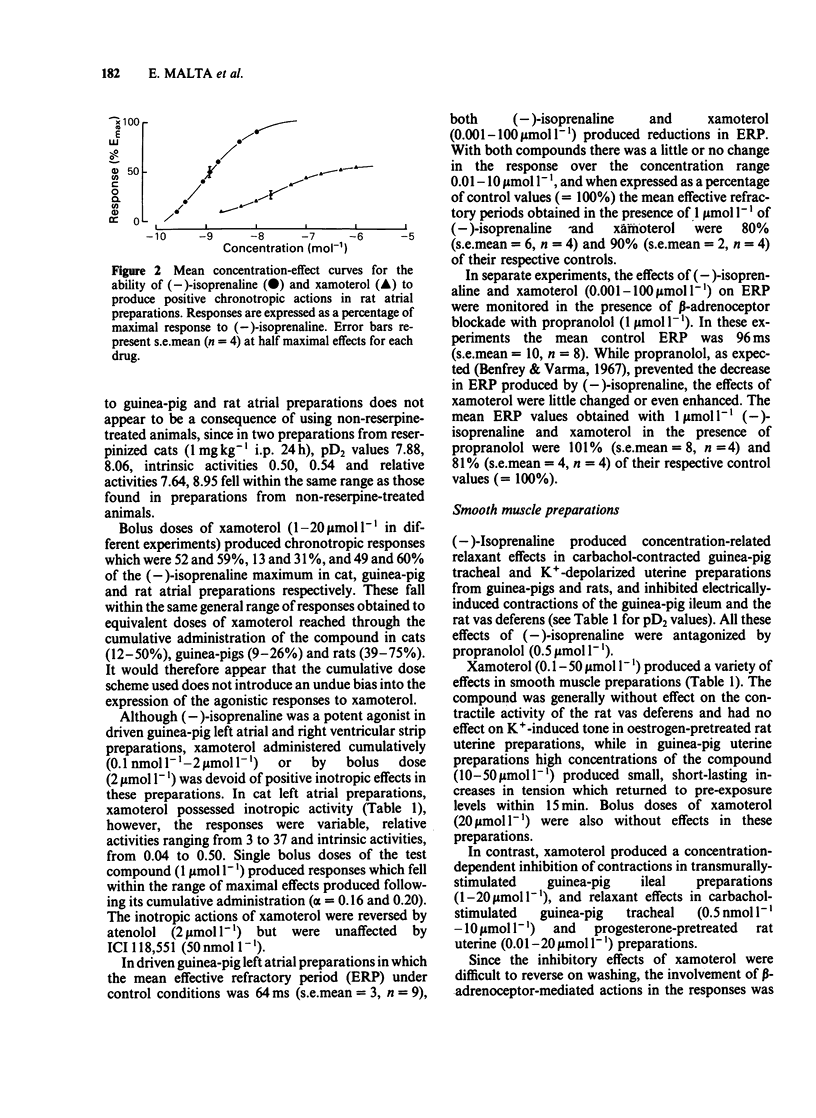
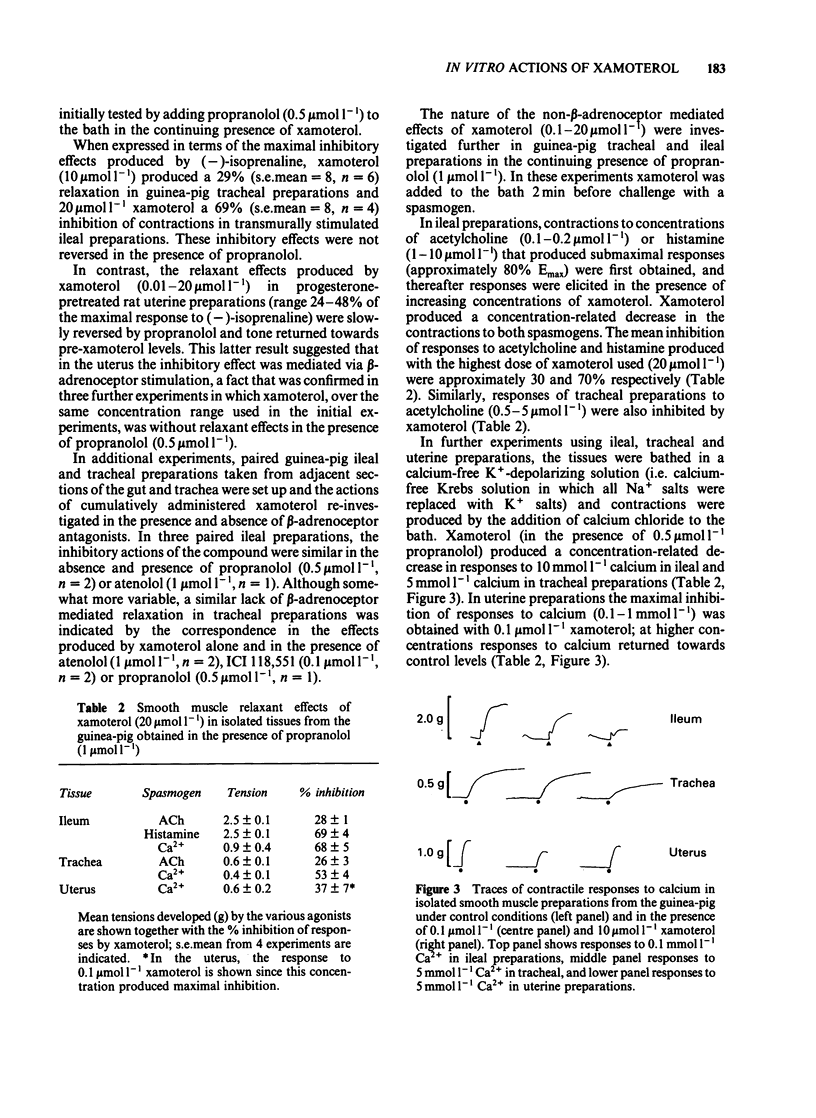
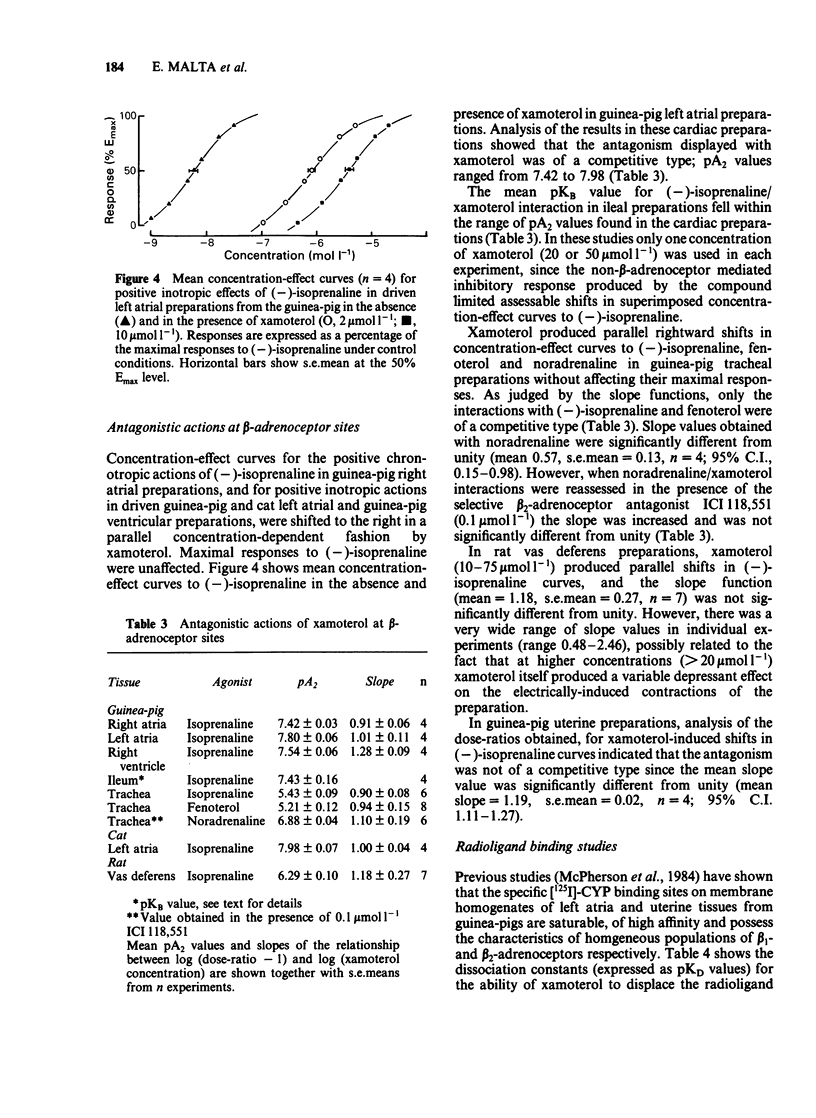
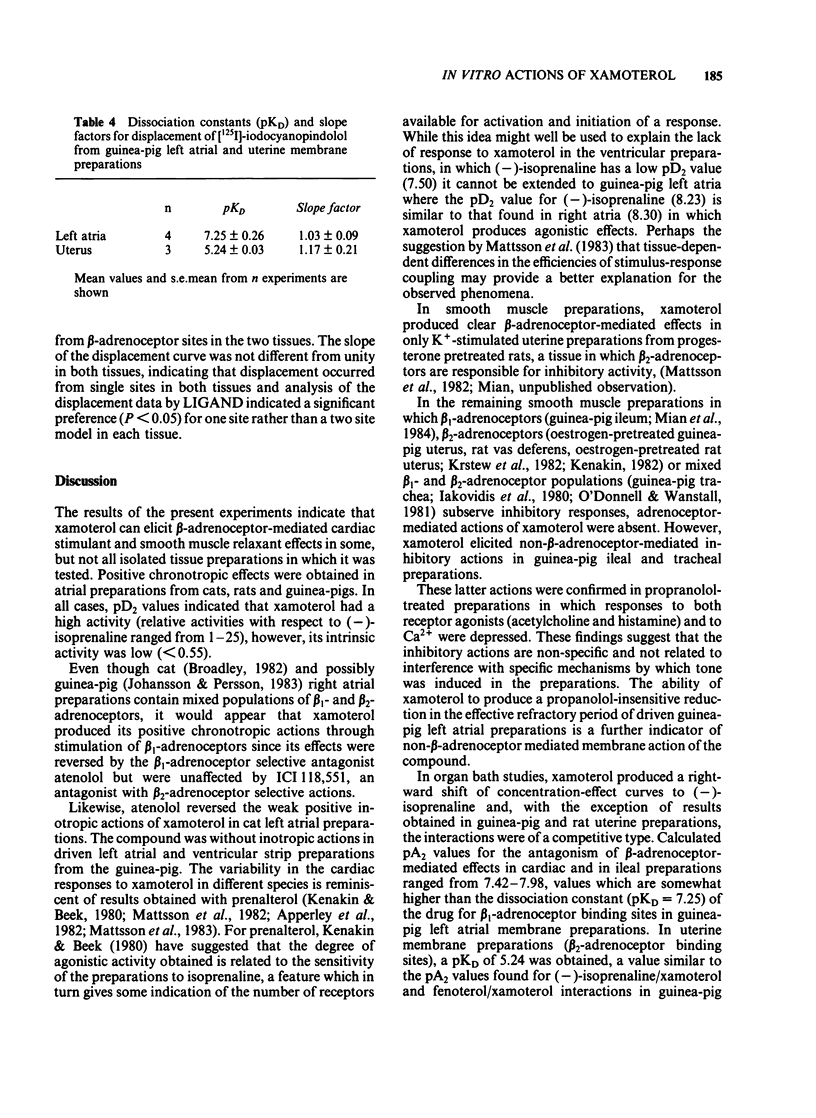
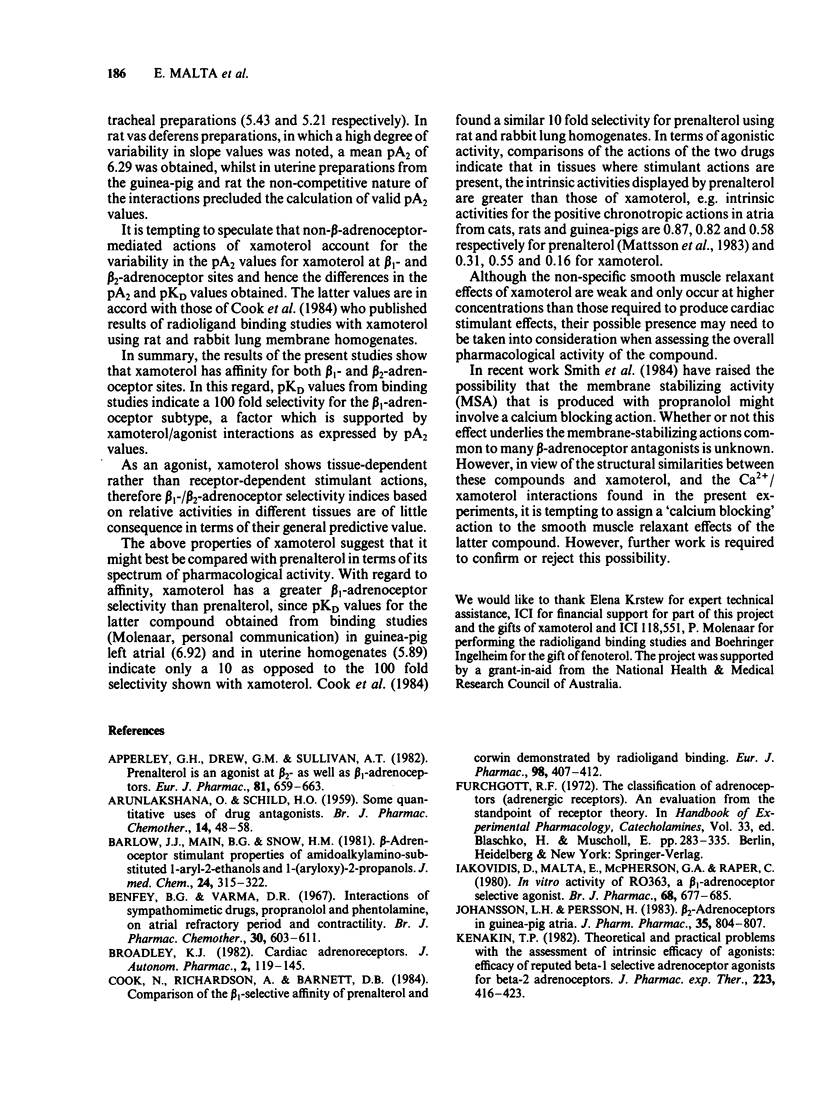
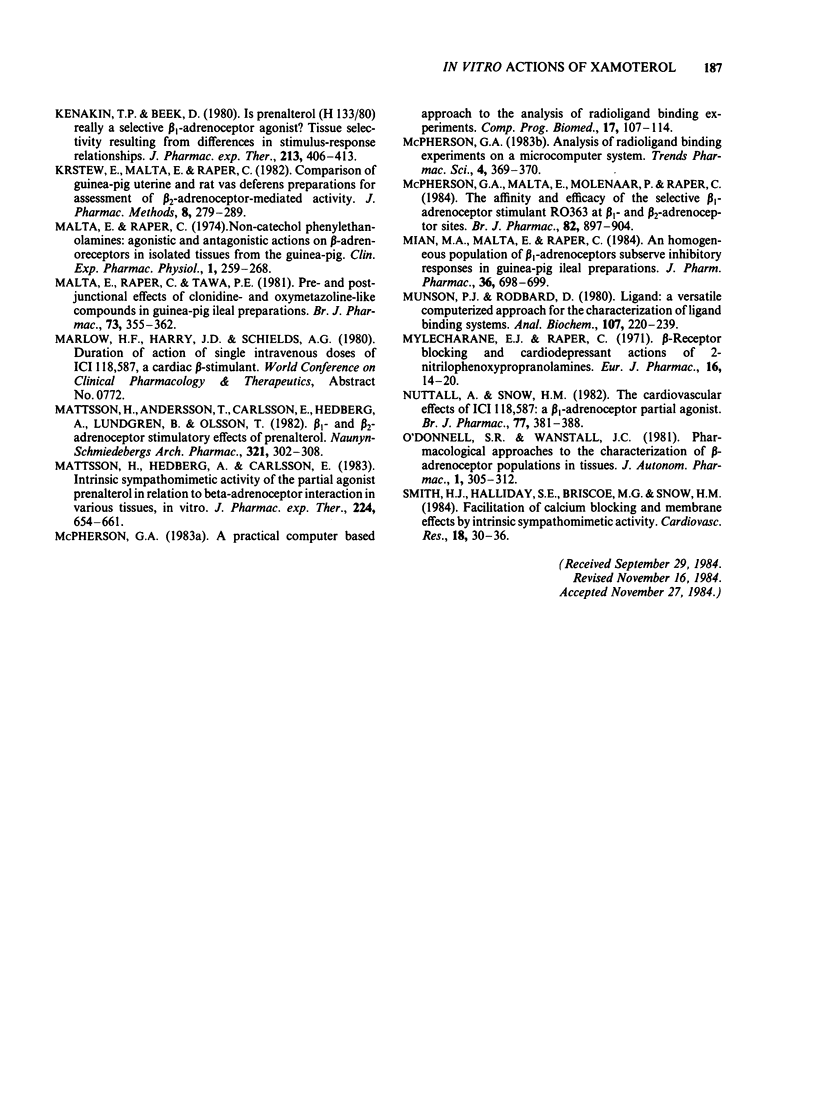
Selected References
These references are in PubMed. This may not be the complete list of references from this article.
- ARUNLAKSHANA O., SCHILD H. O. Some quantitative uses of drug antagonists. Br J Pharmacol Chemother. 1959 Mar;14(1):48–58. doi: 10.1111/j.1476-5381.1959.tb00928.x. [DOI] [PMC free article] [PubMed] [Google Scholar]
- Apperley G. H., Drew G. M., Sullivan A. T. Prenalterol is an agonist at beta 2- as well as at beta 1-adrenoceptors. Eur J Pharmacol. 1982 Jul 30;81(4):659–663. doi: 10.1016/0014-2999(82)90356-9. [DOI] [PubMed] [Google Scholar]
- Barlow J. J., Main B. G., Snow H. M. Beta-adrenoceptor stimulant properties of amidoalkylamino-substituted 1-aryl-2-ethanols and 1-(aryloxy)-2-propanols. J Med Chem. 1981 Mar;24(3):315–322. doi: 10.1021/jm00135a015. [DOI] [PubMed] [Google Scholar]
- Benfey B. G., Varma D. R. Interactions of sympathomimetic drugs, propranolol and phentolamine, on atrial refractory period and contractility. Br J Pharmacol Chemother. 1967 Aug;30(3):603–611. doi: 10.1111/j.1476-5381.1967.tb02166.x. [DOI] [PMC free article] [PubMed] [Google Scholar]
- Cook N., Richardson A., Barnett D. B. Comparison of the beta 1 selective affinity of prenalterol and corwin demonstrated by radioligand binding. Eur J Pharmacol. 1984 Mar 2;98(3-4):407–412. doi: 10.1016/0014-2999(84)90289-9. [DOI] [PubMed] [Google Scholar]
- Iakovidis D., Malta E., McPherson G. A., Raper C. In vitro activity of RO363, a beta1-adrenoceptor selective agonist. Br J Pharmacol. 1980 Apr;68(4):677–685. doi: 10.1111/j.1476-5381.1980.tb10860.x. [DOI] [PMC free article] [PubMed] [Google Scholar]
- Johansson L. H., Persson H. Beta 2-adrenoceptors in guinea-pig atria. J Pharm Pharmacol. 1983 Dec;35(12):804–807. doi: 10.1111/j.2042-7158.1983.tb02900.x. [DOI] [PubMed] [Google Scholar]
- Kenakin T. P., Beek D. Is prenalterol (H133/80) really a selective beta 1 adrenoceptor agonist? Tissue selectivity resulting from differences in stimulus-response relationships. J Pharmacol Exp Ther. 1980 May;213(2):406–413. [PubMed] [Google Scholar]
- Kenakin T. P. Theoretical and practical problems with the assessment of intrinsic efficacy of agonists: efficacy of reputed beta-1 selective adrenoceptor agonists for beta-2 adrenoceptors. J Pharmacol Exp Ther. 1982 Nov;223(2):416–423. [PubMed] [Google Scholar]
- Krstew E., Malta E., Raper C. Comparison of guinea pig uterine and rat vas deferens preparations for assessment of beta 2-adrenoceptor-mediated activity. J Pharmacol Methods. 1982 Dec;8(4):279–289. doi: 10.1016/0160-5402(82)90045-6. [DOI] [PubMed] [Google Scholar]
- Malta E., Raper C. Non-catechol phenylethanolamines: agonistic and antagonistic actions on beta-adrenoreceptors in isolated tissues from the guinea-pig. Clin Exp Pharmacol Physiol. 1974 May-Jun;1(3):259–268. doi: 10.1111/j.1440-1681.1974.tb00548.x. [DOI] [PubMed] [Google Scholar]
- Malta E., Raper C., Tawa P. E. Pre- and postjunctional effects of clonidine- and oxymetazoline-like compounds in guinea-pig ileal preparations. Br J Pharmacol. 1981 Jun;73(2):355–362. doi: 10.1111/j.1476-5381.1981.tb10429.x. [DOI] [PMC free article] [PubMed] [Google Scholar]
- Mattsson H., Andersson T., Carlsson E., Hedberg A., Lundgren B., Olsson T. beta 1-and beta 2-adrenoceptor stimulatory effects of prenalterol. Naunyn Schmiedebergs Arch Pharmacol. 1982 Dec;321(4):302–308. doi: 10.1007/BF00498518. [DOI] [PubMed] [Google Scholar]
- Mattsson H., Hedberg A., Carlsson E. Intrinsic sympathomimetic activity of the partial agonist prenalterol in relation to beta adrenoceptor interaction in various tissues, in vitro. J Pharmacol Exp Ther. 1983 Mar;224(3):654–661. [PubMed] [Google Scholar]
- McPherson G. A. A practical computer-based approach to the analysis of radioligand binding experiments. Comput Programs Biomed. 1983 Aug-Oct;17(1-2):107–113. doi: 10.1016/0010-468x(83)90031-4. [DOI] [PubMed] [Google Scholar]
- McPherson G. A., Malta E., Molenaar P., Raper C. The affinity and efficacy of the selective beta 1-adrenoceptor stimulant RO363 at beta 1- and beta 2-adrenoceptor sites. Br J Pharmacol. 1984 Aug;82(4):897–904. doi: 10.1111/j.1476-5381.1984.tb16488.x. [DOI] [PMC free article] [PubMed] [Google Scholar]
- Mian M. A., Malta E., Raper C. An homogeneous population of beta 1-adrenoceptors subserves inhibitory responses in guinea-pig ileal preparations. J Pharm Pharmacol. 1984 Oct;36(10):698–699. doi: 10.1111/j.2042-7158.1984.tb04849.x. [DOI] [PubMed] [Google Scholar]
- Munson P. J., Rodbard D. Ligand: a versatile computerized approach for characterization of ligand-binding systems. Anal Biochem. 1980 Sep 1;107(1):220–239. doi: 10.1016/0003-2697(80)90515-1. [DOI] [PubMed] [Google Scholar]
- Mylecharane E. J., Raper C. Beta-receptor blocking and cardiodepressant actions of 2-nitrilophenoxypropanolamines. Eur J Pharmacol. 1971 Sep;16(1):14–20. doi: 10.1016/0014-2999(71)90051-3. [DOI] [PubMed] [Google Scholar]
- Nuttall A., Snow H. M. The cardiovascular effects of ICI 118,587: A beta 1-adrenoceptor partial agonist. Br J Pharmacol. 1982 Oct;77(2):381–388. doi: 10.1111/j.1476-5381.1982.tb09309.x. [DOI] [PMC free article] [PubMed] [Google Scholar]
- O'Donnell S. R., Wanstall J. C. Pharmacological approaches to the characterization of beta-adrenoreceptor populations in tissues. J Auton Pharmacol. 1981 Sep;1(4):305–312. doi: 10.1111/j.1474-8673.1981.tb00460.x. [DOI] [PubMed] [Google Scholar]
- Smith H. J., Halliday S. E., Briscoe M. G., Snow H. M. Facilitation of calcium blocking and membrane effects by intrinsic sympathomimetic activity. Cardiovasc Res. 1984 Jan;18(1):30–36. doi: 10.1093/cvr/18.1.30. [DOI] [PubMed] [Google Scholar]


